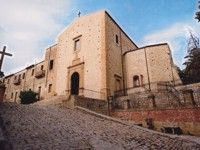Home - In and around
ST. PETER'S CHURCH PIAZZA ARMERINA
At the time of its construction it was outside the walls of Piazza Armerina and depended on the Grand Prior of St. Andrew. The current building is the result of the work of expansion of the Franciscan friars, to whom (after long-standing disputes) in early 1500 was given. These also built the convent, and still today we can see next to the church.
The opening of the complex took place in 1562. Part of the work such as the construction of the main chapel, the south of the square chapels and cloisters were performed thanks to the noble Brother Jerome Cagno's Square and for that reason were carved over the presbytery symbols of his family.
In 1624 the monastery of St. Peter, by granting the viceroy Emanuele Filiberto di Savoia, was declared royal patronage and the consequent raising of the royal coat of arms in the church. So it was that the noble families of that period (Trigona of Cimia, Trigona Gatta, Sanfilippo, Boccadifuoco, Polizzi, De Assoro) had built inside the church chapels of great value in order to use them as mausolei.Nel Meanwhile the adjacent monastery became famous for its rich library, which in 1876 contributed with its volumes at preparing the current municipal library.
St. Peter's Church is a fine example of mid-Renaissance architecture. The facade is very simple, embellished only by the Mannerist portal sandstone.
The simple exterior contrasts with the numerous and refined decorative and architectural elements that are inside it. Once inside we can indeed observe the magnificent wooden coffered ceiling perfectly preserved; They are no less the aforementioned noble chapels, in particular that of the Trigona family Cimia that presents very valuable bas-reliefs made by Antonio Gagini. Another detail to watch carefully is the great arc interposed between the single nave and the chancel which is embellished with carvings and refined reliefs. Unfortunately it has been lost on the ancient paving made with the famous ceramics of Caltagirone. Behind the main altar is a wooden tabernacle surmounted by a large painting depicting the saints Peter and Paul, artwork robbed.
source institutional church St.Peter site
The opening of the complex took place in 1562. Part of the work such as the construction of the main chapel, the south of the square chapels and cloisters were performed thanks to the noble Brother Jerome Cagno's Square and for that reason were carved over the presbytery symbols of his family.
In 1624 the monastery of St. Peter, by granting the viceroy Emanuele Filiberto di Savoia, was declared royal patronage and the consequent raising of the royal coat of arms in the church. So it was that the noble families of that period (Trigona of Cimia, Trigona Gatta, Sanfilippo, Boccadifuoco, Polizzi, De Assoro) had built inside the church chapels of great value in order to use them as mausolei.Nel Meanwhile the adjacent monastery became famous for its rich library, which in 1876 contributed with its volumes at preparing the current municipal library.
St. Peter's Church is a fine example of mid-Renaissance architecture. The facade is very simple, embellished only by the Mannerist portal sandstone.
The simple exterior contrasts with the numerous and refined decorative and architectural elements that are inside it. Once inside we can indeed observe the magnificent wooden coffered ceiling perfectly preserved; They are no less the aforementioned noble chapels, in particular that of the Trigona family Cimia that presents very valuable bas-reliefs made by Antonio Gagini. Another detail to watch carefully is the great arc interposed between the single nave and the chancel which is embellished with carvings and refined reliefs. Unfortunately it has been lost on the ancient paving made with the famous ceramics of Caltagirone. Behind the main altar is a wooden tabernacle surmounted by a large painting depicting the saints Peter and Paul, artwork robbed.
source institutional church St.Peter site



